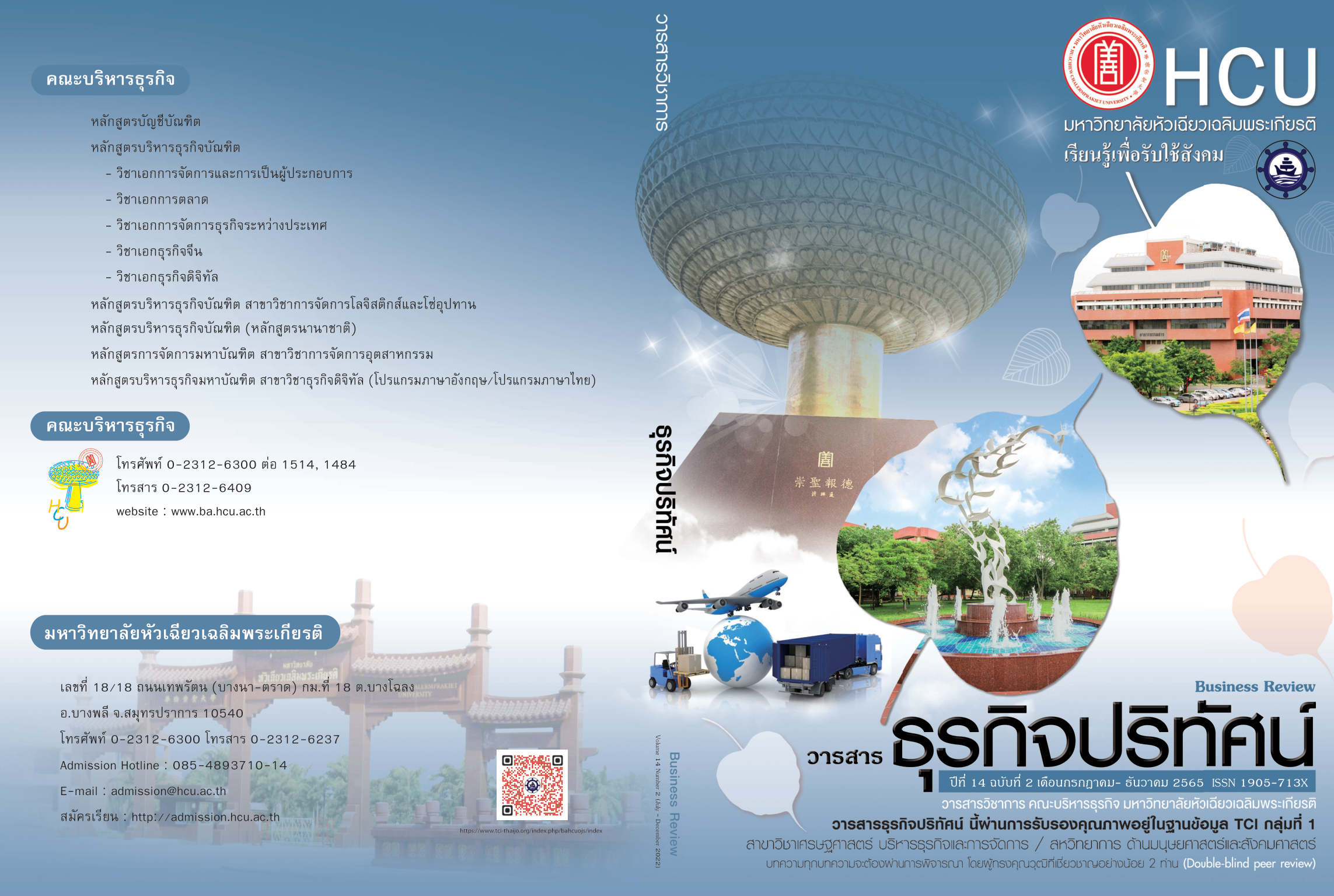Modelling the Influence of the Perceived Value on Trust and Customer Loyalty of Chinese Perspective in Boutique Hotel
Keywords:
Perceived value, Trust, Loyalty, Boutique hotelAbstract
This study aims to propose relationship between perceived value, trust and satisfaction in predicting customer loyalty. Quantitative method was used in this study, and 400 customers were conducted by questionnaire with quota sampling at boutique hotels in Phuket. A data was tested by structural equation modeling statistic. The result showed that perceived value had directly affected on trust. Moreover, it had indirectly affected on customer loyalty mediated by trust. In addition, trust had directly affected on customer loyalty. These results could help marketers to develop perceived value and enhance customers’ perception of trust. On the other hand, the marketers could create the great guideline to attract customer loyalty.
References
Ashton, A. S., Scott, N., Solnet, D., & Breakey, N. (2010). Hotel restaurant dining: The relationship between perceived value and intention to purchase. Tourism and Hospitality Research, 10(3), 206-218.
Assaf, A. G., Josiassen, A., Cvelbar, L. K., & Woo, L. (2015). The effects of customer voice on hotel performance. International Journal of Hospitality Management, 44, 77-83.
Cantallops, A. S., & Salvi, F. (2014). New consumer behavior: A review of research on eWOM and hotels. International Journal of Hospitality Management, 36, 41-51.
Carmines, E. G., & Zeller, R. A. (1988). Reliability & validity assessment. California: Sage.
Chang, K.-C. (2013). How reputation creates loyalty in the restaurant sector. International Journal of Contemporary Hospitality Management, 25(4), 536-557.
Chen, P.-T., & Hu, H.-H. (2010). The effect of relational benefits on perceived value in relation to customer loyalty: An empirical study in the Australian coffee outlets industry. International Journal of Hospitality Management, 29(3), 405-412.
Choi, H., Jang, J., & Kandampully, J. (2015). Application of the extended VBN theory to understand consumers’ decisions about green hotels. International Journal of Hospitality Management, 51, 87-95.
Evanschitzky, H., Ramaseshan, B., Woisetschlager, D. M., Richelsen, V., Blut, M., & Backhaus, C. (2012). Consequences of customer loyalty to the loyalty program and to the company. Journal of the academy of Marketing Science, 40(5), 625-638.
Fornell, C., & Larcker, D. F. (1981). Evaluating structural equation models with unobservable variables and measure. Journal of marketing research, 18, 39-50.
Gallarza, M. G., Arteaga, F., Del Chiappa, G., & Gil-Saura, I. (2015). Value dimensions in consumers’ experience: Combining the intra-and inter-variable approaches in the hospitality sector. International Journal of Hospitality Management, 47, 140-150.
Gronroos, C., & Ravald, A. (2011). Service as business logic: Implications for value creation and marketing. Journal of Service Management, 22(1), 5-22.
Hair, J. F., Anderson, B. W., Babin, B. J., & Anderson, R. E. (2014). Multivariate data analysis with reading (Vol. 8th). New Jersey: Prentice-Hall.
Han, H., & Hyun, S. S. (2015). Customer retention in the medical tourism industry: Impact of quality, satisfaction, trust, and price reasonableness. Tourism Management, 46, 20-29.
He, H., Li, Y., & Harris, L. (2012). Social identity perspective on brand loyalty. Journal of business research, 65(5), 648-657.
Henderson, J. C. (2011). Hip heritage: The boutique hotel business in Singapore. Tourism and Hospitality Research, 11(3), 217-223.
Jamal, S. A., Othman, N. A., & Muhammad, N. M. N. (2011). Tourist perceived value in a community-based homestay visit: An investigation into the functional and experiential aspect of value. Journal of Vacation Marketing, 17(1), 5-15.
Jin, N., Line, N., & Merkebu, J. (2016a). Examining the impact of restaurant innovativeness on relationship quality in luxury restaurants. International Journal of Hospitality & Tourism Administration, 17(4), 449-471.
Jin, N., Line, N., & Merkebu, J. (2016b). The impact of brand prestige on trust, perceived risk, satisfaction, and loyalty in upscale restaurants. Journal of Hospitality Marketing & Management, 25(5), 523-546.
Kandampully, J., Zhang, T., & Bilgihan, A. (2015). Customer loyalty: a review and future directions with a special focus on the hospitality industry. International Journal of Contemporary Hospitality Management, 27(3), 379-414.
Kim, H. J., Park, J., Kim, M.-J., & Ryu, K. (2013). Does perceived restaurant food healthiness matter? Its influence on value, satisfaction and revisit intentions in restaurant operations in South Korea. International Journal of Hospitality Management, 33, 397-405.
Kim, M., & Qu, H. (2012). A refined model of relationship selling between meeting planners and suppliers. Journal of Travel & Tourism Marketing, 29(2), 105-118.
Kotler, P., & Keller, K. L. (2012). Marketing management (14th ed.). NJ: Pearson.
Kozak, M., & Decrop, A. (2009). Handbook of tourist behavior: Theory and practice. New York: Routledge.
Kuo, N.-T., Chang, K.-C., Cheng, Y.-S., & Lai, C.-H. (2013). How service quality affects customer loyalty in the travel agency: The effects of customer satisfaction, service recovery, and perceived value. Asia Pacific Journal of Tourism Research, 18(7), 803-822.
Ladhari, R., & Michaud, M. (2015). eWOM effects on hotel booking intentions, attitudes, trust, and website perceptions. International Journal of Hospitality Management, 46, 36-45.
Lai, I. K. (2015). The roles of value, satisfaction, and commitment in the effect of service quality on customer loyalty in Hong Kong–style tea restaurants. Cornell Hospitality Quarterly, 56(1), 118-138.
Lee, J.-S., & Back, K.-J. (2010). Examining antecedents and consequences of brand personality in the upper-upscale business hotel segment. Journal of Travel & Tourism Marketing, 27(2), 132-145.
Lien, C.-H., Wen, M.-J., Huang, L.-C., & Wu, K.-L. (2015). Online hotel booking: The effects of brand image, price, trust and value on purchase intentions. Asia Pacific Management Review, 20(4), 210-218.
Lovelock, C., & Wirtz, J. (2011). Service marketing: People, technology, strategy (7th ed.). NJ: Prentice Hall.
Martinez, P. (2015). Customer loyalty: Exploring its antecedents from a green marketing perspective. International Journal of Contemporary Hospitality Management, 27(5), 896-917.
Martinez, P., & Rodriguez del Bosque, I. (2013). CSR and customer loyalty: The roles of trust, customer identification with the company and satisfaction. International Journal of Hospitality Management, 35, 89-99.
Mcintosh, A. J., & Siggs, A. (2005). An exploration of the experiential nature of boutique accommodation. Journal of travel research, 44(1), 74-81.
McNeill, D. (2009). The airport hotel as business space. Geografiska Annaler. Series B. Human Geography, 19, 219-228.
Morgan, R. M., & Hunt, S. D. (1994). The commitment-trust theory of relationship marketing. the Journal of Marketing, 58(3), 20-38.
Nunkoo, R., & Gursoy, D. (2016). Rethinking the role of power and trust in tourism planning. Journal of Hospitality Marketing & Management, 25(4), 512-522.
Oliver, R. L. (2015). Satisfaction: A behavioral perspective on the consumer (2nd ed.). New York: Routledge.
Ozturk, A. B., & Qu, H. (2008). The impact of destination images on tourists' perceived value, expectations, and loyalty. Journal of Quality Assurance in Hospitality & Tourism, 9(4), 275-297.
Prebensen, N. K., & Xie, J. (2017). Efficacy of co-creation and mastering on perceived value and satisfaction in tourists' consumption. Tourism Management, 60, 166-176.
Ramanathan, U., & Ramanathan, R. (2011). Guests' perceptions on factors influencing customer loyalty: An analysis for UK hotels. International Journal of Contemporary Hospitality Management, 23(1), 7-25.
Ramseook-Munhurrun, P., Seebaluck, V., & Naidoo, P. (2015). Examining the structural relationships of destination image, perceived value, tourist satisfaction and loyalty: Case of Mauritius. Procedia-Social and Behavioral Sciences, 175, 252-259.
Rogerson, J. M. (2010). The boutique hotel industry in South Africa: Definition, scope, and organization. Urban Forum, 21, 425-439.
Rogerson, J. M., & Kotze, N. (2011). Market segmentation and the changing South African hotel industry (1990 to 2010). African Journal of Business Management, 5(35), 13523-13533.
Ryu, K., Lee, H.-R., & Gon Kim, W. (2012). The influence of the quality of the physical environment, food, and service on restaurant image, customer perceived value, customer satisfaction, and behavioral intentions. International Journal of Contemporary Hospitality Management, 24(2), 200-223.
So, K. K. F., King, C., Sparks, B. A., & Wang, Y. (2013). The influence of customer brand identification on hotel brand evaluation and loyalty development. International Journal of Hospitality Management, 34, 31-41.
Teo, P., & Chang, T. C. (2009). Singapore’s postcolonial landscape: Boutique hotels as agents. In T. Winter, P. Teo & P. C. Chang (Eds.), Asia on tour: exploring the rise of Asian tourism (pp. 81-96). Abingdon: Routledge.
Wu, H.-C., Cheng, C.-C., & Ai, C.-H. (2018). A study of experiential quality, experiential value, trust, corporate reputation, experiential satisfaction and behavioral intentions for cruise tourists: The case of Hong Kong. Tourism Management, 66, 200-220.
Zeithaml, V. A. (1988). Consumer perceptions of price, quality, and value: a means-end model and synthesis of evidence. the Journal of Marketing, 52(3), 2-22.
Downloads
Published
How to Cite
Issue
Section
License
Copyright (c) 2022 Business Review Journal

This work is licensed under a Creative Commons Attribution-NonCommercial-NoDerivatives 4.0 International License.
All articles published in the Business Administration and Management Journal Review are copyrighted by the journal.
The views and opinions expressed in each article are solely those of the individual authors and do not represent those of Huachiew Chalermprakiet University or any other faculty members. Each author is fully responsible for the content of their own article. Any errors or issues found are the sole responsibility of the respective author.




